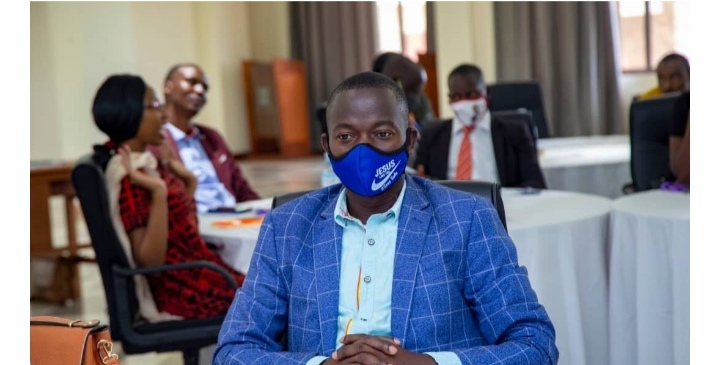Recently, the Constitutional Court delivered its judgment in which Michael Kabaziguruka a staunch member of FDC and former Member of Parliament Nakawa East Constituency was challenging his trial in the General Court Martial.
The petitioner (Michael Kabaziguruka) was on 8th June, 2016 arrested and detained at Uganda Police special investigative Unit (SIU) Kireka where he spent the night and on the following day was placed under house arrest by officers of the Uganda Police. On 28th of June, 2016, he was arraigned in the General Court Martial for offences relating to national security contrary to S.130 (1) (f) of the UPDF Act and that of treachery contrary to S.129 (a) of the same Act.
The petitioner objected to his trial by the General Court Martial claiming that it had no jurisdiction to try him because it was not a competent Court established under the constitutional authority. The General Court Martial insisted that it is a court of law with the power to try the petitioner and other civilians.
The petitioner stayed on remand for several months until he was granted bail by the High Court on 20th October, 2016. Therefore, pursuant to Article 137(1) and (3) of the Constitution, the petitioner moved the Constitutional Court to interpret the Constitution and make declarations on a number of questions.
The questions for determination were set out in the submissions of the petitioner as follows:
- “Whether the General Court Martial established under section 197 of the UPDF Act is a competent Court within the meaning of Articles 28(1), 126(2), 129(2) and (3) of the Constitution of the Republic of Uganda.’’
- “Whether section 197 of the UPDF Act, 2005 is inconsistent with and in contravention of Articles 28(1), 126(1), 129(2) and (3) and 210 of the Constitution of the Republic of Uganda to the extent that it purports to create a court of law without Constitutional authority.’’
- “Whether S.2 of the UPDF Act is inconsistent with and in contravention of Articles 28(1) and 44(C) of the Constitution of the Republic of Uganda to the extent that it defines a service offence to mean any offence under all the laws of Uganda, thereby conferring jurisdiction unto the Court Martial over any criminal offence including non-disciplinary offences and over every person.’’
- “Whether the act of charging/ arraigning the petitioner before the General Court Martial holden at Makindye is inconsistent with and in contravention of Article 28(1) of the Constitution of the Republic of Uganda.’’
- “Remedies available to the parties.’’
Great strides were made in this judgment as the Constitutional Court pronounced progressive declarations that are likely to give respite to civilians that have strong reservations about being subjected to the jurisdiction of the General Court Martial established under S.197 of the UPDF Act. These inter alia include: –
The Constitutional Court pronounced itself on the fact that the General Court Martial established under Section 197 of the UPDF Act is a competent quasi-judicial military Court established under the UPDF Act whose jurisdiction is limited to the enforcement of military discipline. I find the words “Limited to the enforcement of military discipline’’ instructive and a step forward in Uganda’s jurisprudence as far as removing civilians from the ambit or jurisdiction of the General Court Martial or Military law is concerned. This implies that civilians are exempted from being dragged to the General Court Martial for offences prescribed under Part VI of the UPDF Act.
Previous cases that have been placed before Court for interpretation have fallen short of addressing the issue of jurisdiction expressly. A case in point is the case of Attorney General v Joseph Tumushabe (Constitutional Appeal. No.3 of 2005) where Mulenga JSC who handed down the lead judgment to which other Justices of the Supreme Court agreed to, opined that the Courts Martial are not parallel but complementary to civilian courts hence the convergence at the Court of Appeal level. While analyzing the hierarchical nature of Courts in Uganda’s corpus juris, the Judge averred that the General Court Martial which whose appeals lie before the Court Martial Appeal Court, is both a subordinate Court within the meaning of Article 129(1)(d), and lower than the High Court in the Appellate hierarchy of Courts. This proves that though the courts tried to make strong pronouncements against the Courts Martial as seen above, the Kabaziguruka case is particularly instrumental in defining by trimming and / or containing the jurisdiction of the Courts martial in Uganda.
The Constitutional Court in taking progressive steps towards trimming the powers of the General Court Martial held that the General Court Martial’s jurisdiction is only limited to trying service offences specified under the UPDF Act, only in respect of persons subject to Military law. Section 2 of the UPDF Act, 2005 defines service offence to mean “An offence under this Act (UPDF Act) or any other Act for the time being in force, committed by a person while subject to military law.’’ The words “or any other Act’’ in section 2 were problematic in the sense that they made the section to mean any offence under all the laws of Uganda, thereby conferring jurisdiction unto the Court Martial over any criminal offence including non-disciplinary offences and over every person. This was unnecessarily stretching far and wide the jurisdiction of Military Courts in Uganda.
Therefore, limiting the jurisdiction of the General Court Martial to trying service offences enshrined in the UPDF Act and only in respect of persons subject to military law implies that offences triable by civil courts of judicature that is those encapsulated under Article 129 of the 1995 Constitution are taken out of the ambit of the General Court Martial. Therefore, if a civilian commits an offence which is provided for in Acts of Parliament like the Penal code Act, the Anti-terrorism Act, the Fire Arms Act and so on, such a person is exempted from the jurisdiction of the General Court Martial. No wonder the Constitutional Court in the Kabaziguruka case further held that Military law under the UPDF Act must be construed to exclude laws that are the preserve of civil Courts of Judicature established under Chapter Eight of the Constitution.
THE PROBLEMATIC SECTION 119 OF THE UPDF ACT
Although the Constitutional Court in the Kabaziguruka case has struck down Section 119 (1) (h) of the UPDF Act for being unconstitutional and inconsistent with Article 28 (1) of the Constitution, Section 119(1) (g) was left standing.
The basis of subjecting Civilians to military law is found in part V of the UPDF Act, S.119 (1) (g). Section 119 (1) provides that the following persons shall be subject to military law-
(g) every person, not otherwise subject to military law, who aids or abets a person subject to military law in the commission of a service offence.
The above provision of the UPDF Act has received legal backing from decided cases. In the case of Namugerwa Hadija v Attorney General & Anor (Civil Appeal No.04 of 2012) the Supreme Court held that Civilians in Uganda can become subject to Military law and once they do can be tried by the General Court Martial. Tumwesigye, JSC, further said that he does not see any exemption of civilians from the application of s.179 of the UPDF Act once they become subject to Military law under S. 119(1) and (h) of the Act.
In the instant case (Kabaziguruka), the Constitutional Court agrees that Civilians who voluntarily place themselves under the jurisdiction of the UPDF Act can be tried under Military law. Kakuru JA while making orders in this case stated that:
“Persons subject to military law under the UPDF Act must exclude all those persons who have not voluntarily placed themselves under the jurisdiction of that Act except as provided for under s.119(1)(g).’’
Justice Kakuru went ahead and held that: –
“Section 119(1) (g) of the UPDF Act is not unconstitutional, provided the person not otherwise subject to military law is tried as an accomplice together with a person who is subject to Military law as the principal offender on the same charge sheet.’’
Justice Kakuru is of the fortified view that, all persons recruited into the armed forces do so voluntarily. He opines that each individual who seeks to enlist, it must be presumed, is well aware of the risks such enlistment entails. He or she contracts to voluntarily limit some of his or her fundamental rights and freedoms. Where an individual aids and abets a person subject to military law to commit a military offence, such person would by his own consideration have brought him or herself under the ambit of the UPDF Act.
The above seems to have informed the reasoning of the Judge to hold that Section 119 (1) (g) is not unconstitutional thus making it lawful to try civilians as accomplices.
In my opinion, civilians should not be brought under the jurisdiction of the General Court Martial even when they have allegedly aided or abetted serving military officers. In my opinion, these can be presented during proceedings in the court martial simply as witnesses and then tried in civil courts. Parliament was empowered by the Constitution to enact a law to regulate the Uganda People’s Defence Forces under Article 210 and it is through that spirit that it enacted the UPDF ACT, 2005. This can be deduced from the long title of the Act which inter alia states that:
“An Act to provide for the regulation of the Uganda People’s Defence Forces.’’ Therefore, the UPDF Act was never intended to be an Act of general application. It is a statute of special and limited application. Article 210 of the Constitution from which Parliament derived the mandate to enact the UPDF Act, is itself restrictive on the coverage of the laws regulating the defence forces. Therefore, the General Court Martial established under S.197 of the UPDF Act is a competent Military Court specifically designed to deal with military discipline.
Article 210 of the Constitution which gives Parliament mandate to enact the UPDF Act should be interpreted together with Article 28 which provides for the right to a fair hearing. The principles of Constitutional interpretation as set out in Paul Kawanga Ssemogerere and anor V Attorney General SC (Constitutional Appeal No.1 of 2002) require the Constitution to be read together as an integral whole and no particular provision destroying the other but each sustaining the other. That is the rule of harmony, completeness and exhaustiveness.
It should be noted that the Constitutional Court in the Kabaziguruka case stated that because the judges of the military courts are appointed by the High Command of the defence forces, they are not part of the Judiciary but rather of the Executive. Important to note is that, judges in the civilian courts are appointed by the President on recommendation of the Judicial service commission and approval of Parliament which is not the case for the military courts as explained above. This made court to hold that the General Court Martial is not impartial and independent within the meaning of Article 28 of the Constitution because it is likely to obey commands of the appointing authority and therefore cannot guarantee a fair, speedy and public hearing.
The Constitutional Court in Caroline Turyatemba & 4 others V AG (Constitutional Petition No.15 of 2006) held inter alia that the right to be heard is a fundamental basic right. It is one of the cornerstones of the whole concept of a fair and impartial trial. It is my opinion that the UPDF Act cannot override the provisions of the Constitution because indisputably, the latter is the supreme law of the land.
Therefore, subjecting Civilians who aid or abet serving military officers to commit a military offence is denying them their non-derrogable right provided for under Article 28 and further placed far from reach by Article 44 (C).
I agree, as Justice Kakuru stated in his lead judgment that, in this Country “all Persons recruited into the Armed forces do so voluntarily.’’ Important to note however is that the authority for recruitment is expressly vested in the Defence Forces Council as encapsulated under S.51 of the UPDF Act. Further, one has to meet the prerequisites enshrined in S.52 of the same Act. Every person on enrollment into the Defence Forces has to take the oath of allegiance and the oath of secrecy set out in the fifth and sixth schedule of the UPDF Act. Therefore, no person can qualify to be part of the defence forces without undergoing the procedural steps and meeting the requirements and qualifications set out in part IV of the UPDF Act, 2005.
In my opinion, it is only people who satisfy the requirements of part IV that can be regarded to have voluntarily placed themselves under the jurisdiction of the General Court Martial. A civilian who is not recruited and enrolled into the Army cannot be said to have waived his or her rights of not being subjected to Military law just because he or she is alleged to have aided or abetted a person subject to Military law in the commission of a service offence under S.119 (1) (g).
I agree with the reasoning of Justice Remmy Kasule in the Kabaziguruka case that ‘’a civilian who is alleged to aid or abet a person subject to Military law does not become a serving member of the Uganda Peoples’ Defence Forces to be tried by military court. It is the civilian courts that have jurisdiction over such a person. This informed his holding that Section 2 and 119 (1) (g) of the UPDF Act are inconsistent with Articles 28 (1), 44 (c) and 210 (b).
THE GOLDEN OPPORTUNITY OF STRIKING DOWN THE ONLY REMAINING SECTION THAT BRINCGS CIVILIANS UNDER THE JURISDICTION OF THE GENERAL COURT MARTIAL (119 (1) (G) OF THE UPDF ACT).
As the position of law stands, the only law that has remained in Uganda’s Statute books that brings civilians under the jurisdiction of Martial law is S.119 (1) (g) of the UPDF Act.
As the Attorney General possibly prepares to appeal the Constitutional Court decision in Hon. Michael Kabaziguruka V AG (Constitutional Petition No.45 of 2016), it is crucial to point out that it presents a great opportunity for the respondent to make a cross appeal over the Constitutionality of S.119 (1) (g) which I think can be premised on the analysis I have made above.
I am cognizant of the Supreme Court decision in Namugerwa Hadijah (Supra) that held inter alia that Civilians can be tried in military courts by Section 119 (1) (g) of the UPDF Act. However, the decision in Namugerwa Hadijah (Supra) can only be used as a persuasive precedent but not binding, I say so while well aware of Article 132 of the Constitution which provides for jurisdiction of the supreme court.
The decision in Namugerwa Hadijah (Supra) was decided by the Supreme Court while sitting in an appeal as a second appellate Court hearing an appeal from the decision of the Court of Appeal in an ordinary civil appeal. The quorum of the Supreme Court was a panel of 5 Justices of the Supreme Court unlike in Constitutional Appeals where the quorum is a minimum of a panel of 7 Justices of the Supreme Court.
In Murisho Shafi & Ors V AG & Anor (Constitutional Application No. 02 of 2017), Egonda Ntende JCC disagreed with the holding in George Owor V AG & Anor (Application No.38 of 2010) which had criticized the holding in Isaac Isabirye V AG & Anor Miscellaneous Application No.001 of 2007, 2008{ ULR} 523 for not making reference to Section 13 of the Judicature Act when it held that neither a three Judge Panel or a single Judge of the Court had jurisdiction to hear the application for interim orders before Court. Egonda Ntende, clearly stated that, S.13 of the Judicature Act is clear and unambiguous and hence applies only to the business before the Court of Appeal.
Further, in drawing distinction between the Court of Appeal and the Constitutional Court, Egonda Ntende JCC in Murisho Shafi (Supra) stated that the Court of Appeal is not the Constitutional Court. Two separate Courts with separate jurisdiction were created by the Constitution. One cannot simply read the provisions that relate to one and apply them to the other.
Still in Muriho Shafi (Supra), Kakuru JCC alluded to the confusion between the two Courts when he stated that: –
“There has been confusion in jurisprudence especially at this Court arising from its failure to separate and treat as separate entities, the Constitutional Court and the Court of Appeal. These are two separate and distinct Courts established separately by the Constitution each with its own jurisdiction and rules of procedure.
Another plausible Court decision which in my view is a justification not to treat the Namugerwa Hadijah case (Supra) as a binding precedent is the American Procurement Company V Attorney General & Anor (Civil Appeal No. 0035 of 2009) where the Constitutional Court refused to follow the Supreme Court holding in Gordon Sentiba & 2 ors V the Inspectorate of Government (SC Civil Appeal No.6 of 2006) where it had been held that the Inspectorate of Government is not a body corporate and as such it has no capacity to sue or be sued. There was two contracting Court decisions over the corporate status of the Inspectorate of Government, that is the Gordon Sentiba case (Supra) and Inspectorate of Government V Kikondwa Butama Farms Ltd & Anor (Constitutional Petition No.14 of 2007) where it was held that the Inspectorate of Government has corporate status. The Court of Appeal while comparing the two contrasting decisions stated that the ‘’proposition that the IGG has corporate status was set out by the Constitutional Court’’. Justice Kakuru, JA further stated that the Supreme Court sitting in a civil appeal cannot set aside a decision of the Constitutional Court. It is only the Constitutional Appeal Court that has the power to set aside such a decision. Therefore if the decision of the Supreme Court in Gordon Sentiba (Supra) was binding on the Constitutional Court, the Court of Appeal in American Procurement Company (Supra) should have followed it but declined to do so.
As I conclude, I agree with the above reasoning by the Honorable Justices of the Constitutional Court in Murisho Shafi (Supra) as it is also my fortified opinion that indeed, the Constitutional Court and the Court of Appeal are two separate Courts. Whereas the Court of Appeal has only appellate jurisdiction, the Constitutional Court has original jurisdiction. The quorum for each of the Courts is constituted differently and their respective mandate also differ. Therefore, a decision of the Court of Appeal cannot be held to be that of the Constitutional Court.
Going by the above reasoning and holding in Murisho Shafi (Supra) and American Procurement Company (Supra), it makes me believe that the case of Namugerwa Hadijah (Supra) being a Civil Appeal is not binding on the Constitutional Court and neither does the Supreme Court need to distinguish it in order to strike down Section 119 (1) (g) of the UPDF Act.
Should the prospective respondent in the Kabaziguruka case make a Cross Appeal, the Supreme Court will be tasked with a duty of using its constitutional mandate to strike down Section 119 with the most powerful legal missiles and that will mark the end of trying Civilians in Military Courts in Uganda’s jurisprudence.
The author is Thomas Kayanja- A law Student at Makerere University And the FDC Youth league secretary for Education, Sports and Student Affairs
Do you have a story in your community or an opinion to share with us: Email us at editorial@watchdoguganda.com













